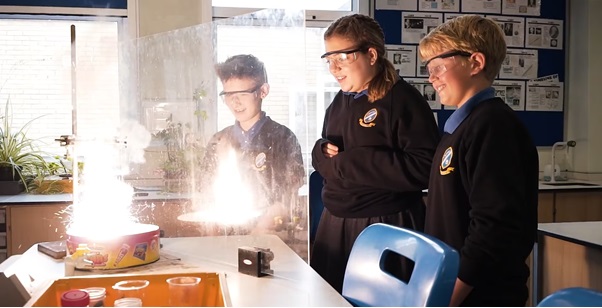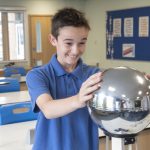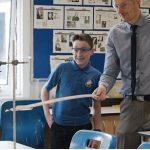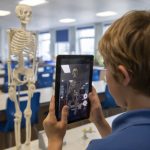Science - Weobley High
Weobley’s Science department is fully committed to student achievement and looks forward to supporting you through your education at the school and ensuring you achieve examination results of which you can be proud.
to supporting you through your education at the school and ensuring you achieve examination results of which you can be proud.
We are continuously developing and individualising the curriculum to meet each student’s needs and maximize their achievement. GCSE Combined Sciences alongside Separate Sciences will be delivered at Key Stage 4.
Students in Years 7, 8 and 9 have three hours of Science per week. Students study Biology, Chemistry and Physics in groups set by ability.
At Key Stage Four, most students will study Combined Sciences GSCE which combines Biology, Chemistry and Physics and is worth two GSCEs. Students who have a strong aptitude for science can study the three Science subjects separately leading to three GSCEs. The Subject Leaders are Mr M Dixon and Mr S Peruffo, to whom all queries regarding Science at Weobley should be made.
Science is a very important subject to have on the curriculum within schools for many reasons. Our science curriculum is designed and taught in a way that encourages our pupils to look at the world around them, problem solve and think critically about why things happen. In this sense, our science curriculum is designed to develop many thinking skills that are essential in future STEM careers but also absolutely necessary if we want our pupils to question and develop a love for learning as they grow up.
Our curriculum intent, is to know exactly what success at GCSE looks like for all our pupils and then ensure years, terms and individual lessons are planned with that end point in mind. We want pupils to feel like they are going on a learning journey from year 7 to year 11 and beyond, and that they can see the big picture putting each lesson into a particular context of that journey.
The Science Curriculum is planned and sequenced to ensure that the material studied is accessible to all learners. It has a focus on knowledge and practical skills that enables pupils to develop as they progress from Year 7 to 11. The curriculum provides and challenge to pupils across a variety of topics, which in turn provide them with the opportunities to develop both independent and collaborative learning.
Our Key Stage 3 curriculum is robust enough in preparing our pupils for Key Stage 4 but also keeping them engaged for five years. We do not want to lose that special feeling Science can give to pupils that is not always measurable with exams or assessment. It is important to the department that particular units and practical investigations are still being taught to our Key Stage 3 pupils despite being removed from the GCSE syllabus. For example, the topic of space has been removed from GCSE, apart from Separate Sciences, but we did not want to take the opportunity to learn about the Universe away from our year 7 pupils. Even though units such as space are not assessed at GCSE Combined level, they still play their part in exciting and enthusing our pupils so that they develop a passion for Science and enjoy coming to our lessons.
At Key Stage 4 we continue to develop and improve on the skills the pupils have learnt during Key Stage 3. Pupils follow either the AQA Separate Science specification or the AQA Combined Science (Trilogy) specification and therefore pupils leave with either 3 individual GCSE’s (Biology, Chemistry, Physics) or 2 Combined GCSE’s. Both course provide pupils with the opportunities to develop, discuss and reflect on a variety of issues facing Science and the world we live in.
The Science department recognises the importance of practical skills and the need to link Science to outside the classroom. As a result, we put an emphasis on pupils completing practical work and developing these skills as an individual. To promote Science and STEM careers we both invite in outside agencies within this sector to provide workshop activities for pupils along with school trips to give pupils an experience of Science in the world today.
A quality Science curriculum should enable its pupils to develop their scientific investigative skills and knowledge of fundamentals in Biology, Chemistry and Physics but also provide lots of opportunity for application of this in new situations. Therefore, when designing our assessments, we ensured it tested recall and application of skills and knowledge. If pupils can confidently apply their skills and knowledge repeatedly in unknown situations, then they have been successful in science.
The assessments at Key Stage 3 are regular and follow the completion of 3 units: a Biology, Chemistry and Physics unit. This allows ‘long-term’ recall to be assessed and prepare the pupils for Key Stage 4 and the GCSE exams.
At Key Stage 4 pupils are regularly assessed and monitored in a variety of ways. These assessments can take the form of short in class tests, longer exam style tests, practical investigations and write-ups. The assessments are designed so that teachers can address any specific gaps in the pupils’ understanding or misconceptions. These assessments are reviewed which helps pupils improve their attainment and motivate them for the future.
The impact of our curriculum is measured in a number of different ways:
- Learning walks/Lesson observations and dialogue with teachers
- Pupil and teacher progress tracking
- Book monitoring and teacher feedback
- Speaking to pupils about their learning
- Subject vocabulary testing
- Attainment and achievement outcomes
- Attendance and behaviour data
- Enrichment activities



